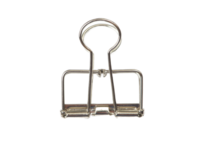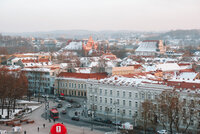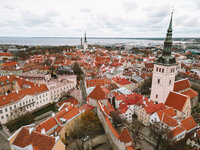

A Complete Guide to the Dative Case
In this study guide, you will learn all about the dative case in Russian! If you don’t know what the dative case is, first read my guide on the Russian Case System to get a better understanding. The dative case is used in several situations including describing likes and dislikes, describing needs, indicating indirect objects more.
Before we take a look at all the usages and how to form the datives case, here is a basic example of how the dative case works. Take the word “маши́на” in Russian (car). It ends in an “а” so we know that it is feminine. If you look at the endings chart below, you’ll see that feminine nouns that end in “а” change to “е“. So, you can see that change in the following example in which the dative case applies: Она подошла к маши́не.
This sentence means “She approached the car.” The preposition “k” triggers the dative case, which is why маши́на changed to маши́не.
So, that’s one example of the dative case. Now, let’s check out how to form the dative case, when to use the dative case, and then test your understanding with a quiz at the end!
Last updated: 7/24/2023
For information on other Russian cases, check out my other guides: Accusative, Prepositional, Genitive
Давайте начнём!
The Dative Case in Russian

How to Form the Dative Case in Russian
Adjective and Noun Endings
| Gender | Singular | Plural | ||
|---|---|---|---|---|
| Adj. | Noun | Adj. | Noun | |
| Masculine | ому/ ему | cons. → cons. + у й → ю ь → ю |
ым / им | cons. → cons. + ам й → ям ь → ям |
| Feminine | ой / ей | а → е я → е ия → ии ь → и |
а → ам я → ям ь → ям |
|
| Neuter |
ому/ ему | о → у е → ю мя → мени |
о → ам е → ям мя → енам |
|
Personal Pronouns
| Nominative | Dative |
|---|---|
| я | мне |
| ты | тебе |
| он | ему (к нему) |
| она | ей (к ней) |
| мы | нам |
| вы | вам |
| они | им (к ним) |
Possessive Pronouns
| Masculine, Neuter | Feminine | Plural |
|---|---|---|
| мой, моё → моему | моя → моей | мои → моим |
| твой, твоё → твоему | твоя → твоей | твои → твоим |
| наш, наше → нашему | наша → нашей | наши → нашим |
| ваш, ваше → вашему | ваша → вашей | ваши → вашим |
| её, его, их do not change | ||




When to Use the Dative Case in Russian


1. To discuss likes & dislikes
Кому (не) нравится что? – Who (doesn’t) like what?
- Ей не нра́вится вино́. – She doesn’t like wine.
- Мне нра́вятся языки́. – I like languages.
- Тебе понра́вился фильм? – Did you like the film?
- Наде́юсь, что тебе понра́вится. – I hope you like it.


2. To Indicate Your Age
Сколько (кому) лет? – How old?
- Несмотря на то, что Ивану всего 25 лет, он уже бога́т. – Despite the fact that Ivan is only 25 years old, he is already rich.
- Она вы́шла за́муж, когда ей бы́ло восемнадцать лет. – He moved to Russia last month.


3. To Indicate the Indirect Object
Кому? – to whom?
- Она мне позвони́ла. – She called me.
- Он редко да́рит свое́й жене́ пода́рки. – He rarely gives his wife gifts.
- Я расскажу́ вам всё, что зна́ю. – I’ll tell you everything you know.
- Маша дала Владимиру бутылку воды.– Masha gave Vladimir a bottle of water.
- Принеси́ мне мою шля́пу. – Bring me my hat.
- Он всегда покупа́ет ей дорогу́ю оде́жду. – He always buys her expensive clothes.
Common verbs
- врать / совра́ть – to lie (to)
- лгать / солга́ть – to lie (to)
- говори́ть / сказа́ть – to speak
- груби́ть / нагруби́ть- to be rude (to/towards)
- жа́ловаться / пожа́ловаться- to complain (to)
- звони́ть / позвони́ть – to call, to phone
- писа́ть / написа́ть – to write (to)
- хва́статься / похва́статься – to boast (to)
- обеща́ть / пообеща́ть – to promise (to)
- объясня́ть / объясни́ть – to explain (to)
- отвеча́ть / отве́тить – to reply (to)
- жела́ть / пожела́ть – to wish (to)
- предлага́ть / предложи́ть – to suggest, to offer (to)
- запреща́ть / запрети́ть – to forbid (to)
- улыба́ться / улыбну́ться – to smile (at)
- дава́ть / дать – to give (to)
- меша́ть / помеша́ть – to disturb
- помога́ть / помо́чь – to help


4. To Discuss Feelings, States, and Emotions
Кому + наре́чие – Who + adverb
- Тебе не холодно? – Aren’t you cold?
- Мне бы́ло весело. – I was having fun.
- Я спроси́л у него, почему ему грустно. – I asked him why he was sad.


5. To Talk about Needs
Кому надо? – Who needs?
- Мне от тебя ничего не надо. – I don’t need anything from you.
- Что бы́ло надо Ивану? – What did Ivan need?
- Мне надо, чтобы ты пошёл со мной. – I need you to come with me.
Кому нужно*? – Who needs?
- Тебе нужна́ кни́га? – Do you need the book?
- Ему ну́жен зо́нтик. – He needs an umbrella.
- Я ду́маю, мне нужны́ подтяжки. – I think I need braces.
For more about Russian modal verbs like надо and нужно, check out my article How To Use Modal Verbs In Russian: Должен, Надо, Нужно, Можно +More!
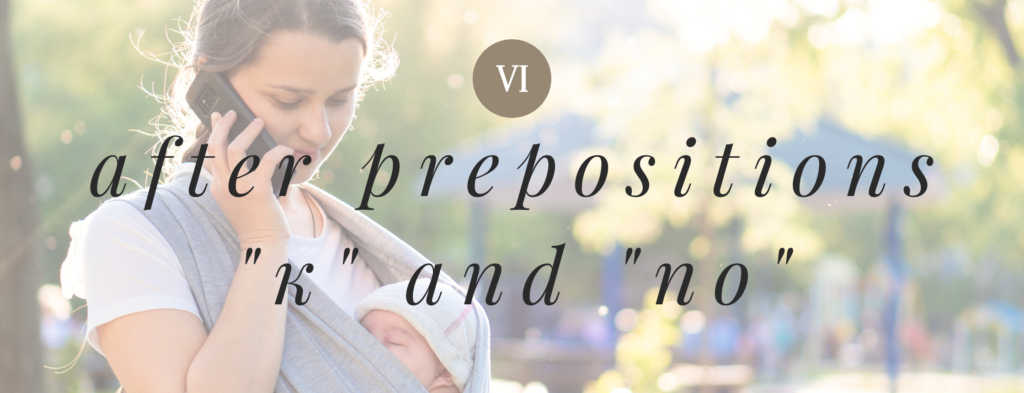

6. After Certain Prepositions
К чему? – To/Towards what?
К кому? – To/Towards whom?
- Упо́рный труд не всегда приво́дит к успе́ху. – Hard work doesn’t always lead to success.
- После совеща́ния она напра́вилась прямо к своему́ столу́. – After the meeting she headed straight to her desk.
- Я бы хоте́л записа́ться на приём к врачу́.– I’d like to make a doctor’s appointment.
- Я еду в Москву в гости к подру́ге. – I’m going to Moscow to visit a friend.
По чему? – About/On/Along/Over/By what?
Meanings:
- “About” or “on” to talk about a subject area
- “On” or “Along” when talking about movement
- “On,” “Over,” or “By” to denote the means by which you do some action
- Я дово́лна результа́том своего́ те́ста по матема́тике. – I’m satisfied with the results of my math test.
- Моя́ маши́на слома́лась по доро́ге домой.– My car broke down on the way home.
- Мы ка́ждый день обща́емся по телефо́ну. – We chat every day over the phone.




Practice the Dative Case in Russian!


Questions?
Comment below with any questions you have or write your own examples using the dative case! If you need some more help, watch the videos below for more explanations and examples.
Learn to speak russian
Travel with ease & dive into the culture, history & lifestyle of post-Soviet countries
free russian learning materials
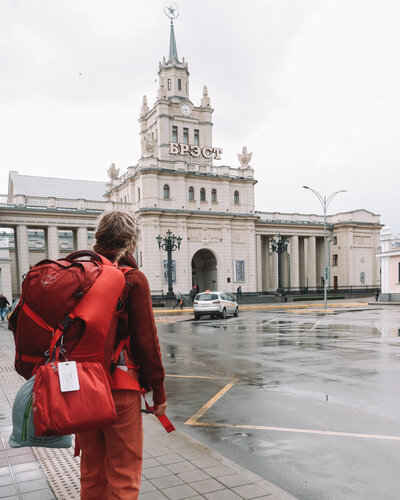
Melissa

Get the Goods
Head over to the Language & Travel Shop to check out my favorite goodies I use for learning Russian and traveling! I've compiled all my favorite products I use when #onthebloc so that you can benefit from them when you travel abroad. Help yourself prepare and support this blog at the same time :) Счастливого пути!
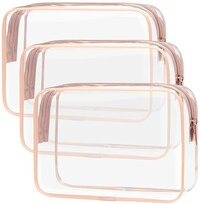



carry-on goods
gifts for travelers
photography
apparel & accessories
textbooks & readers
luggage & bags
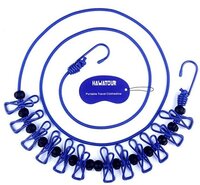
categories
#oTB essentials
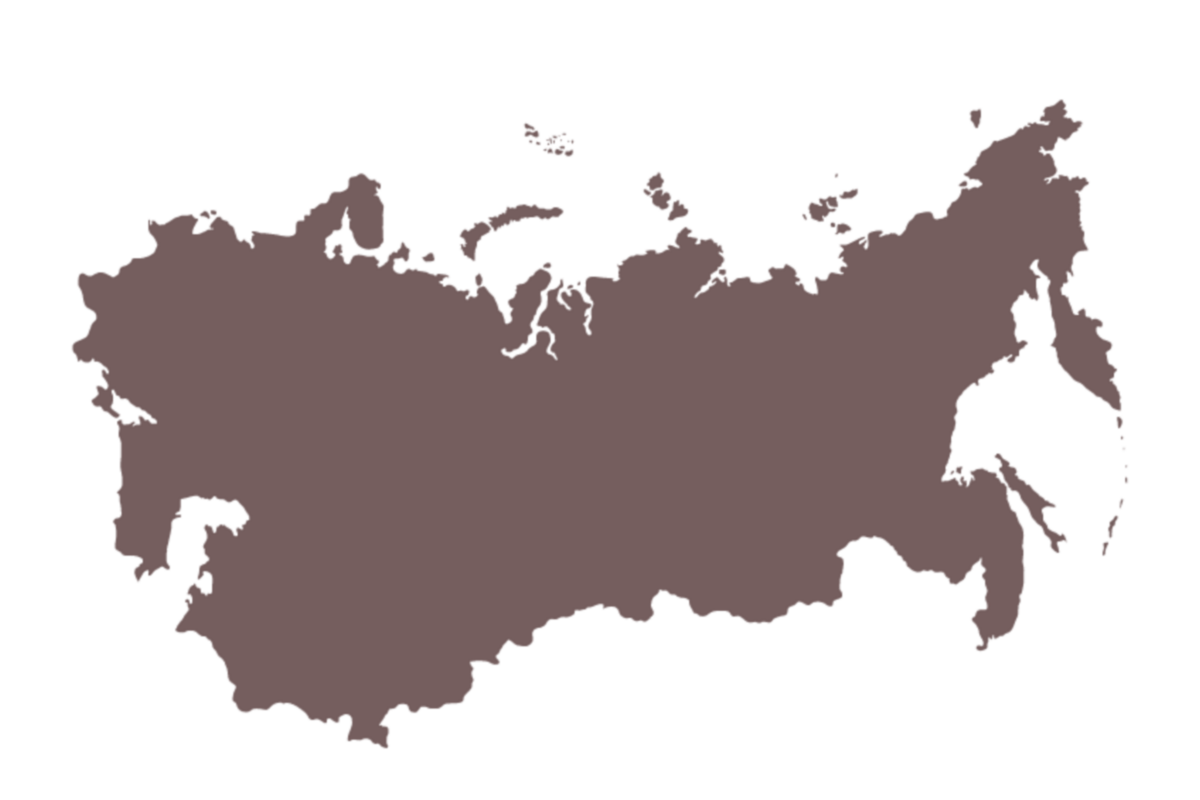
Russian-Speaking Travel Destinations
use your new russian skills in real life!
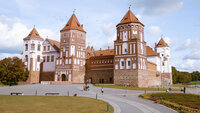
Belarus
EASTERN EUROPE
central Asia
central Asia





Eurasia
Russia
Kyrgyzstan
armenia
Moldova
Kazakhstan
eastern europe
read »
read »
read »
read »
read »
read »
The caucasus
travel guides
Get your FREE #OnTheBloc Starter Kit!
Sign up for the NGB Monthly Newsletter & you'll get a FREE downloadable PDF with Russian language and travel resources for your post-Soviet journey!
оставаться на связи

